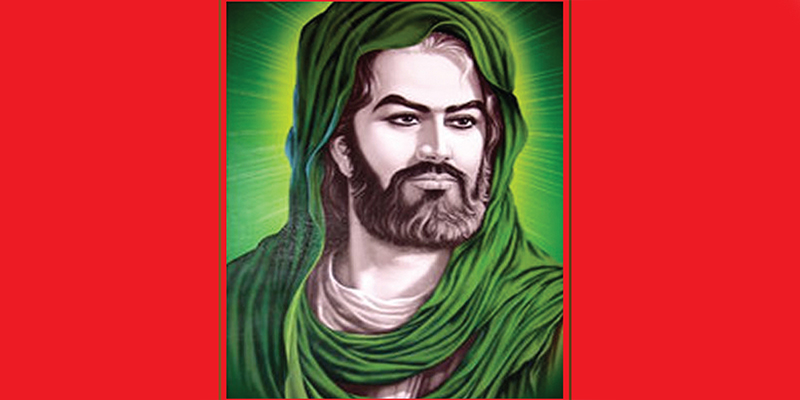
Dear Bektashi clerics, believers and benefactors!
Today, on July 29, after 2:00 p.m., Matem's intention is made, in the World Bektashi Headquarter by His Holiness Haxhi Dede Edmond Brahimaj and in every Bektashi Quarter under the guidance of the clergy.
With a special ceremony, the sherbet is shared and Matemi is hatched. 10 days of mourning are observed during the month of Muharram.
During these ten days, "Hadikaja" (Garden of the Good) is read, until August 8, 2022.
During Matem, do not drink water, milk and all animal products (meat, eggs, fish, etc...).
Vegetables, fruits and all products of the Earth are consumed.
What is Matem?
Matem is the mourning fast, or commemorative mourning, that is held in the first ten days of the month of Muharram. The word Matem is Persian and means Black. And indeed, among these days, the bitter events of Karbala, which happened on this very month, in the year 63 of Hijri, are commemorated. All the sacrifices, self-sacrifice and self-sacrifice that were made there for the protection of democracy and religious provisions, for the general interest, for the good of the people, are pointed out. This sacrifice remained an immortal symbol and unforgettable example of heroism that is commemorated with respect every year on this moon. Many of the Islamic people humbly mention this event every year. They commemorate them with respect, kneel before this memory and shed tears for this event. With this commemoration, the people perpetuate the great name of Imam Hussein, the Father of the Martyrs of Karbala and hate, despise and curse the works of the accursed Yazid. This event left a great impression on the whole world and remained a bitter memory among all. The martyrs of Karbala, with Hussein the Great at their head, fell on the field of honor, being thirsty and burning for a drop of water in the August heat. The Islamic world appreciates this slaughter and in their honor, for ten days in a row, I do not drink water. This act is not a religious ordinance, but an optional desire, voluntarily put into practice by all. As a sign of mourning, during these days the people put aside all the luxuries, they go to the heavens to commemorate these unforgettable events with a sad heart and with laconic words in their mouths: "Here is Imam! Here's Hysen!". During these days, on the occasion of the events of Karbala, all previous events and sacrifices, which were made for the benefit of the people and in favor of the general interest, are commemorated. The sufferings of all the Prophets, who carried out their sacred mission for the good of the world, are mentioned one by one. These sacrifices are valued, exalted and humbled before their memory. Thus, the days of commemoration take on a general meaning and can be called the days of commemoration or commemoration of all world sacrifices made for the good of humanity and for the general interests.
All commemorations take place during ten separate days, in this way:
- On the first night, the following are commemorated:
- The sufferings of the Prophet Adam, to carry out the holy mission. Mention is also made of the crime that happened between his sons and the events that are likely to be perfected.
- The events of Prophet Nuh and his mission are remembered, which suffered a lot from his unfaithful people.
- Mention is made of the sufferings of Ibrahim, who was thrown into the fire by the cursed Nemrud, because he wanted to direct his faith to humanity.
- Mention is made of the sufferings of the Great Yusuf, who was thrown into the well by his brothers, for the sole fault, because he was pure and had won the sympathy of his parents.
- Musa's sufferings from the cursed Pharaoh are mentioned, because the latter wanted to rule the people with violence and be their God.
- And in the end, the sufferings inflicted on Christ the Great by the prepotent, for the sole fault, because he devoted himself without reserve to people, preaching the right path, of peace, justice, brotherhood and human perfection.
- The second night is dedicated to the sufferings of the Prophet Muhammad, who suffered and struggled to bring the people out of the darkness of slavery, into the light of the goodness of humanity.
- The third night is dedicated to the Great Ali, who sacrificed himself and became a martyr, to lead the world on the right path. They destroyed him because he was the apostle of truth.
- The fourth night is dedicated to the Great Imam Hasan, who was treacherously poisoned by the ambitions of wicked people, because he was a lover of peace and preached its qualities.
- On the fifth night, the biography of Imam Hussain, his birth and life is told.
- On the sixth night, the emigration of Imam Hussein from Medina to Mecca is sung, so as not to provoke a quarrel with Yazid.
- The seventh night is dedicated to the martyrdom of Muslim Ykajli, the cousin of Imam Hysen, who went to Qofe (Iraq) as a delegate of the Imam and how he was betrayed, in the end he was martyred with his two sons, Miftari and Ibrahimi, a man seven years old and the other eight.
- On the eighth night, the journey of Imam Hysen to Qofe is commemorated, where he was invited by the people, theaded in the right direction.
- The ninth night commemorates the arrival of Imam Husayn in Karbala, where he received Muslim's letter, with which he warned him not to go to Qofa, because the people returned his word. When Imam Hyseni received the letter, he shed tears and said: "We can't live anymore! We must die!".
- On the tenth night, which is the last night, the battle of Karbala is shown, where Imam Hussain was martyred on the field of honor, together with his companions. He was martyred, but his memory was immortalized and is commemorated every year.
Matem is the mourning that the people do, for Hysen the Great, who was persecuted and fell a martyr in the field of honor, to protect the religious constitution, for the freedom of the people, for his own good. He sacrificed his life, he was martyred with a dry mouth, in the August heat of the Arabian desert, but he kept alive the flag of freedom, the prestige of religious democracy, as it was supposed to, as he had for tradition from his father, the Great Ali . This cruel deed was done by the prepotent of the time, the accursed Yazid, son of Mavija, king of Sham, in Syria. With the death of Mavija, Yazid remained on his father's throne, without implementing the religious provision that the President had to be elected by the will of the people. He arbitrarily took the throne, without doing any legal formalities. The population began to revolt for this injustice, but it was suppressed and imposed on them with murder and terror. As he secured his position in Sham, he sought to expand his influence in other countries as well. However, he was afraid that he would not be able to realize this dream while Imam Hyseni, the grandson of Prophet Muhammad and the son of the Great Ali, was alive. He had this fear, because he knew very well that Hyseni enjoyed all the qualities and merits and was greatly worshiped by the Arab people.
For this he used all the devils and decided to force Hysen to officially recognize him as king by any means. Before that, he sent proclamations to all the Arab governorates, by means of which he made his enthronement known. All scorned this enthronement, but were silent for fear. At this time, Imam Hyseni was in the city of Medina, together with his family. Yazid sent orders to the governor of Medina and asked him to summon the Imam and force him by all means to recognize him in order to see him. When he was called, the Imam replied: "This work is heavy and does not belong to me. Implement the traditional religious law and gather the people's representation. If they decide, I have no objection".
The words of Husayn, the governor referred to Yazid, who was enraged at this refusal and gave orders that the Imam be seized and forced by force, either to accept recognition, or to be executed. The Imam saw that the situation was getting worse and took the whole tribe and went to Mecca. The people of Makkah welcomed him with open arms and gave him great honor. Hundreds, thousands of people came to visit Him and bow down to the Imam. The event made a big fuss and Yazid was very shocked by this work, because he was afraid that Hyseni would revolt the people against him, for the illegal act he did. This kind of thing spread throughout the years. The family members heard this news and immediately wrote thousands of letters to the Imam and begged him with conviction to visit them and direct his eyes to them, that they would be his faithful for the rest of their lives. As these prayers were repeated many times, the Imam wanted to go, but his friends advised him to first send a delegate to investigate, as they were fearful and unfaithful people. Then he decided and sent Myslim Ykajli, his cousin, to investigate. At first they showed great obedience to the Muslim and he wrote to the Imam to leave for Qofe. Imam left for there and was traveling. Yazid heard this news and, fearing revolt, took measures. He sent a terrorist governor there, who killed, mutilated and frightened the Qofelis. They forgot all faith out of fear. Then the capture of Muslim was sought and he went to war with him. After a bloody war, Muslim was martyred and his work was destroyed.
Before he died, Muslim wrote a letter to the Imam and ordered him not to go to Qofa, because they broke the promise. The Imam, traveling, reached the place of Karbala, where he received the bitter news. Desperate, he cried and said: "There is nothing left for us to save now! We'd rather die!"
He asked what they said to that place. When Karbala answered you, he said: "Ah! This is the place of trouble that my father showed me. Here we are destined to await fate!” Then they pitched their tents there and stayed to await their destination. Yazid found out and sent tens of thousands of soldiers to capture them. The army reached there and the war began. Thousands of well-wishers came to the Imam's aid, but he did not support them. He thanked everyone and said: "Thank you very much. Go about your business. I'm off to die! I don't want my friends to suffer!" From these words everyone left. The Imam who blessed them all. Only 72 people remained, who begged him insistently that they wanted to die with him. Their words were followed by crying. The imam thanked all pon this determination and prayed to God for them. And indeed, all of these were martyred before the Imam when the war began.
The Imam, when left alone, did not give up. He fought like a man, until he fell a martyr in the field of honor, as he had for tradition from his father. Thus Hyseni the Great lay down and covered himself with blood, in the dust of the Arabian desert! His body was trampled and despised by Yezid and the sold Yezidists, but his memory remained alive in the hearts of all the people, who every year repeat the mourning, make the commemorative ashura and shed tears and sighs for him and today , lamenting and singing his bravery.
